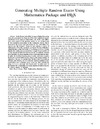Identificador persistente para citar o vincular este elemento:
http://hdl.handle.net/10553/16630
| Título: | Generating multiple random exams using mathematica package and LATEX | Autores/as: | Gómez Déniz, Emilio Dávila-Cárdenes, Nancy García Artiles, Mª Dolores |
Clasificación UNESCO: | 12 Matemáticas | Palabras clave: | Educación superior | Fecha de publicación: | 2015 | Conferencia: | II Jornadas Iberoamericanas de Innovación Educativa en el Ámbito de las TIC y las TAC (InnoEducaTIC 2015) | Resumen: | In the framework of the European Higher Education Area, the assessment has been one of the most important aspects considered. In the Spanish Universities, one of the main differences with regard to the previous system is the incorporation of the continuous assessment to the evaluation process that is understood in several ways depending on the Universities, the courses and the lecturers. Focus on our context, a course of Mathematics of the first academic year in the Faculty of Business Administration at the University of Las Palmas de Gran Canaria (Spain), the continuous assessment has brought the preparation of a large amount of different tests to evaluate the students enrolled in it, therefore the incorporation of new tools and skills in order to make the teaching–learning process easier and more dynamic has become a need mainly in those degrees with a large number of students as the case we consider here. In this work we provide an efficient and effective way to elaborate random multiple-choice examina tion tests (although essay exams are also possible) by using Mathematica package and LATEXin order to make easier to the lectures the preparation of a large number of mid-term tests for a large number of students. | URI: | http://hdl.handle.net/10553/16630 | Fuente: | II Jornadas Iberoamericanas de Innovación Educativa en al ámbito de las TIC (2015) |
| Colección: | Actas de congresos |
Visitas
79
actualizado el 13-abr-2024
Descargas
576
actualizado el 13-abr-2024
Google ScholarTM
Verifica
Comparte
Exporta metadatos
Los elementos en ULPGC accedaCRIS están protegidos por derechos de autor con todos los derechos reservados, a menos que se indique lo contrario.
